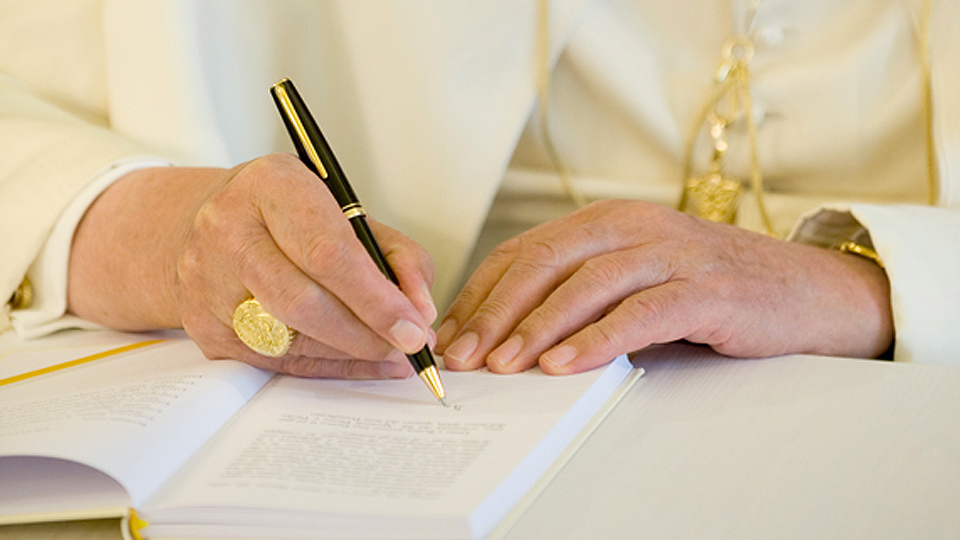

Deacon-structing Doctrine part 2: The List
Deacon Pedro
Sunday, November 25, 2018

Image from Catholic World Report
Last week we defined Doctrine and Dogma.
Doctrine is all Teachings of the Church (Magisterium) that have to do with matters of faith and morals (things that matter). All Doctrine is infallible (not error) and unchangeable. Dogma is all Doctrine that has been divinely revealed, or that have some connection to them. They are defined by the Church and declared binding. That is, they are non-negotiable.I was able to find a list of Dogmas of the Church (see Simple Catholic Truth) , but this is the work of a theologian who himself compiled this list. There is no official list. And there is no official list of all Doctrines. There is, however, apparently, a hierarchy of truths. Hierarchy of Truths According to the Catechism: “In Catholic Doctrine there is a hierarchy of truths, since they vary in their relation to the foundation of the Christian faith.” (#90) The mystery of the Most Holy Trinity is the most fundamental and essential Teaching in the ‘hierarchy of the truths of faith.’ (#234) There are five foundational truths (although these are found throughout the Catechism and in various documents, I have yet to find the one single document that lists them as they are listed in every "foundational truth" website. (Why are these not listed as such in the Catechism or in another Church document?):
- The Blessed Trinity: God is an eternal loving communion of Father, Son, and Holy Spirit
- The Person of Jesus: A divine person who took on human nature in the Incarnation
- The Paschal Mystery: the suffering, death, resurrection, and ascension of Jesus Christ
- The Dignity of the Human Person: made in the image and likeness of God
- The Church: the Body of Christ brought to life in the Holy Spirit
Examples: The articles of the Creed, the Christological dogmas, the Marian dogmas, Christ’s institution of the Sacraments and their efficacy to impart grace, the Real Presence, the sacrificial nature of the Mass, the divine foundation of the Church, the primacy and infallibility of the Roman Pontiff, the existence of original sin, the immortality of the human soul, the immediate recompense after death, the inerrancy of Holy Scripture, the grave immorality of murder.Non-Revealed, yet Definitive Truth (secondary truths): These are Doctrines that are proposed as infallible because they are matters of faith and morals. They are not revealed in themselves, but they are definitively proposed statements on matters closely connected with revealed truth (like the example I gave about Adoration), and are required to explain them or define them effectively. These Truths require “firm and definitive assent”, ie. All Catholics must accept these Teachings as True. If they don’t they are in “error”.
Examples: Principle of natural law, seven Sacraments, condemnation of all terms of discrimination, human dignity and equality, human rights, immortality of the human person, the illicitness of prostitution, male-only priesthood, the legitimacy of the election of a pope, the celebration of an ecumenical council, the canonizations of saints.Authoritative but reformable teaching: These are non-definitive teachings. They are doctrines that help to understand revelation better. They are also called “authentic, but non-infallible teaching.” These doctrines require respect and obedience of will and intellect by all Catholics. If not, they are in “dissent.”
Examples: Biblical criticism, preferential option for the poor, formula for Sacraments, religious liberty, ecumenism, rejection of torture, Anglican orders, teaching on the use of artificial birth control, cremation, capital punishment.Discipline: These are NOT Doctrine. They are universal laws of the Church. It may include particular laws of a diocese, liturgical norms or Church practice. They require obedience by all Catholics. If not, they are in a state of "disobedience".
Examples: Fasting rules, feasts of obligation, celibate priesthood, directives from curia on religious life, use of art/architecture, First Confession before First Communion.I hope this helps a bit. I also found a very interesting chart showing the hierarchy of Truths as it pertains to Papal or Theological Documents. Come back next week to see what those are and also some teachings that have changed in my lifetime (and no one made a peep) and why the “changes” to our understanding of the teaching on Capital Punishment is not really a change. Want to read more? Check out this article from Catholic Exchange on the difference between doctrine and dogma.
 Every week, Deacon Pedro takes a particular topic apart, not so much to explore or explain the subject to its fullness, but rather to provide insights that will deepen our understanding of the subject. And don’t worry, at the end of the day he always puts the pieces back together. There are no limits to deaconstructing: Write to him and ask any questions about the faith or Church teaching: [email protected]
Every week, Deacon Pedro takes a particular topic apart, not so much to explore or explain the subject to its fullness, but rather to provide insights that will deepen our understanding of the subject. And don’t worry, at the end of the day he always puts the pieces back together. There are no limits to deaconstructing: Write to him and ask any questions about the faith or Church teaching: [email protected]Related Articles:
<<













